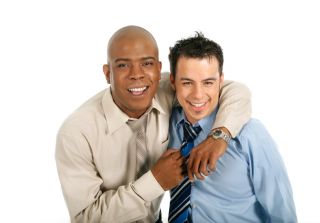Friends
Gay Men and Straight Men as Friends
Heterosexual and gay men can heal and grow as a result of their friendships.
Posted June 27, 2015 Reviewed by Gary Drevitch
I recently finished reading Dr. Robert Garfield’s terrific new book, Breaking the Male Code: Unlocking the Power of Friendship, and last week participated in a joint interview with him by Dr. Dan Gottlieb on WHYY (National Public Radio) in Philadelphia. This all got me thinking about my own friendships and those of my gay male clients. The bonds between gay men and straight women have been written about and featured in popular media (i.e. Sex in the City, Will and Grace), though a lot less has been said about how gay and straight men recognize and negotiate the distinct challenges, complications, and rewards of their friendships.

According to Garfield, among the many obstacles to male-male platonic intimacy, fear of homosexuality looms large. Straight men fret that if they get too close, others will see them as gay; which in their minds means feminine (horrors!), weak, and perverted. Perhaps even scarier is that their emotional connections will somehow morph into sexual attraction. Interestingly, in the U.S., before there was such a thing as a gay identity, some straight men would, with little shame, engage in sexual contact with other men (usually allowing themselves to be fellated) when female partners were otherwise unavailable (see George Chauncey’s seminal book, Gay New York: Gender, Urban Culture, and the Making of the Gay Male World 1890-1940) and there is good reason to believe this still occurs in other countries and cultures. But then, in the U.S. in the mid 20th century this behavior became associated with gay identity, new at the time and seen as criminal and then sick. As a result of this behavior-identity link, sexual congress between gay and straight men decreased considerably, or at least went underground.
Gay men have suffered physical, social, and psychological abuse at the hands of heterosexually identified males who, thanks to homophobia and heterosexism, felt fully justified in inflicting these terrors. Further, male sexuality has traditionally been viewed as predatory and uncontrollable, which some men have used to rationalize the sexual harassment and assault of women. Stories, both real and fictitious, about prison rape among male inmates further reinforce the myth that men are unable to rein in their aggressive sexual tendencies. So it's no wonder hetero men would fear homosexuality and gay men in particular.

This legacy of violence, both physical and psychological, inflicted by straight men toward those of us who are gay naturally fuels our caution and distrust at the thought of befriending them. In his book, Garfield describes the stiff hugs he would receive from a gay friend. Fortunately, Garfield is all about talking such things out—good medicine for those among us who are the strong, silent, swallow-your-feelings-until-you-die-of-a-heart-attack type of guys. As it turns out, the gay friend worried that if he hugged too closely his friend would think he was coming on to him. A straight friend of mine once complained that I don’t give him full body hugs, but instead grab his shoulders keeping my pelvis far from his, thus creating a posture that looks like the letter A. I realized I was doing everything I could to keep my genital area from touching his body. However, my partial embrace left my friend feeling as if I were withholding emotionally. After discussing this, we now fully hug. I am reassured he will not misinterpret any contact between our lower bodies, and he understands my need for this reassurance.
Few things can be a more soothing balm for us gay guys than a close friendship with a heterosexual man. Acceptance and, yes, love, from a guy who is not interested in us sexually but accepts our sexuality can begin to heal the abuse we have experienced from our fathers, bullying peers, and society at large. For the straight guy, friendship with a gay man offers the opportunity to learn important lessons about masculinity, male identity, sexual orientation, and diversity. Thus there is significant payoff for both parties.
But how do we deal with the possible sexual tensions that might come up? What if sexual feelings do emerge, or are already there? First, there is no need to panic. Part of being a mature adult is coming to the sad realization that we are not going to be able to have sexual relationships with everyone who floats our boat. Often these sexual feelings, when not acted upon, can actually fuel affection and intimacy. On the flip side, all adults—male, female, LGBT or otherwise—need to find polite but firm, unambiguous ways to respond to unwanted romantic and sexual invitations.
The trick is not to fear these attractions, or feel ashamed of them, even if they are unrequited. My first glimpse of my straight male friend (the one who complained about my hugging) was in the locker room at a local gym. He is 6’4”, handsome and muscular, and yes, I was physically attracted to him; in some ways, I still am. Now that we are good friends, he and I, along with his wife and my husband, can joke about his eye-candy status without anyone feeling anxious, fearful, or threatened. He is beautiful inside and out, which is why I like him so much.
Granted, if you fall deeply in love with a man who is sexually unavailable, straight or otherwise, and you can’t be around this person without your frustrated wishes for romance interfering with your enjoyment of his company, call it quits. However, it might be a good idea to hang in there, at least for a while, to see what develops. As the quote goes: You can never have too many friends—and friendships between gay and straight guys can be healing and uniquely satisfying for all involved.


